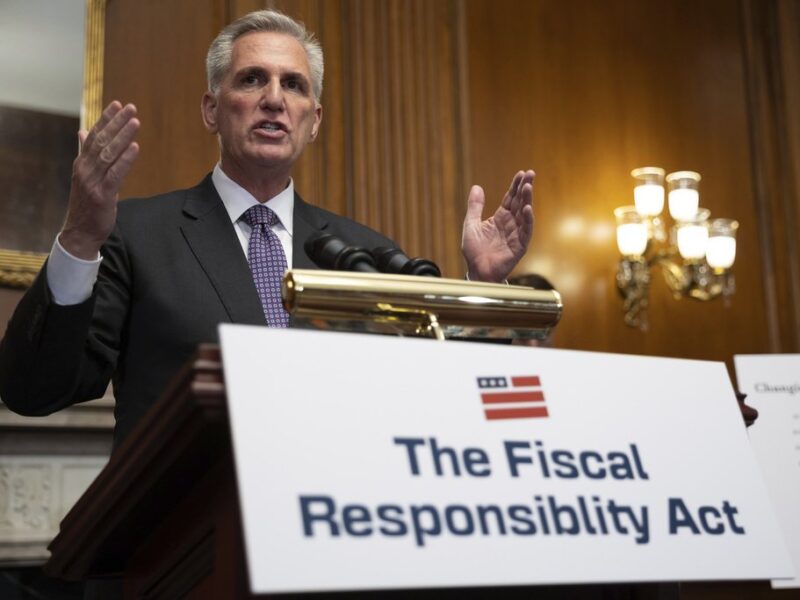House Passes Bill to Avert Default, Despite Hageman’s Objections
The measure now heads to the Senate, though it still faces headwinds to becoming law
- Published In: Politics
- Last Updated: Jun 01, 2023

House Speaker Kevin McCarthy (R-Calif.) faces growing criticism from the most conservative members of his caucus over his support for a bipartisan debt agreement. (Francis Chung/POLITICO via AP Images)
By Jacob Gardenswartz
Special to the Wyoming Truth
WASHINGTON — The U.S. House on Wednesday overwhelmingly passed a measure to cut spending and raise the debt ceiling, sending the bill on to the Senate as the June 5 “X date” — when the federal government will run out of money — looms large.
The 314-117 vote represented something of a rarity in Washington: a bipartisan agreement championed by centrist lawmakers, while those further on the right and the left were unified in opposition.

If the bill becomes law, it would authorize the Treasury Department to borrow additional funds to pay its bills. Absent such a measure, the federal government will default on its obligations for the first time in its history, an unprecedented situation which experts predict could cripple the global economy.
The road to passage in the House was far from easy. Months of prolonged negotiations between House Republican leaders and the White House ultimately produced a bipartisan compromise that raised the debt limit in exchange for narrow spending caps and a slew of other GOP policy priorities.
But as President Joe Biden wrote in a Wednesday night statement following the vote, “neither side got everything it wanted,” and ultimately 46 Democrats opposed the measure, as did 71 Republicans. GOP leaders in particular were confronted with vociferous pushback from the most conservative wing of the conference, with some lawmakers so irate with House Speaker Kevin McCarthy (R-Calif.) for signing off on the agreement as to float ousting him from leadership.
Among the GOP “no” votes was Rep. Harriet Hageman (R-Wyo.), who aligned herself with the far-right Freedom Caucus in opposition to the bill.
“The legislation fails to significantly reduce our national debt and does not do enough to rein in the administrative state,” Hageman said in a statement following her vote against it. “We have very few opportunities and little time to gain control of the unsustainable debt facing our nation – it is imperative that raising the debt ceiling be coupled with more aggressive spending cuts and regulatory reform.”
Nonetheless, leaders from both parties and across branches of government championed the measure. Biden called it a “critical step forward to prevent a first-ever default and protect our country’s hard-earned and historic economic recovery.” McCarthy praised it as “the largest deficit reduction package in American history.” And House Minority Leader Hakeem Jeffries (D-N.Y.) noted that “in divided government, we of course, cannot allow the perfect to be the enemy of the good.”
On to the Senate
Having cleared the House, the debt limit bill now heads to the Senate, where it still faces many hurdles to becoming law.
Though the upper chamber is known to have fewer firebrand legislators, individual lawmakers wield far greater control over proceedings than they do in the House. In effect, any one lawmaker could delay passage beyond the Monday default deadline, meaning financial markets may not rest easy until the legislation has been signed and enrolled.
The bill must earn 60 votes to clear the Senate, and already 12 Senators — 10 Republicans and two Democrats — have pledged to vote against it.
Others still have raised concerns about the measure without fully voicing opposition. Sen. Cynthia Lummis (R-Wyo.), for example, remains a “maybe” on the debt package, she told the Wyoming Truth on Wednesday.
Though Lummis praised elements within the agreement impacting permitting reform, she said she is “concerned that it may not go far enough to get our spending under control.”
“I am still reviewing this bill and its impact on my constituents in Wyoming,” Lummis concluded.
Sen. John Barrasso (R-Wyo.), meanwhile, described the bill Wednesday as a “first step on the road to common sense conservative governing.”
“So many of us wish it could have gone a lot further, specifically with cutting spending,” Barrasso added. “This is a first step. We need many more steps.”
McCarthy’s ‘optimism’ faces growing conservative pushback
Though McCarthy may have inked a decisive victory with the overwhelming passage of the debt agreement, GOP leaders are far from out of the woods.
Since earning the Speaker’s gavel, McCarthy has deftly managed a very slim Republican majority and its disparate factions — often dubbed the “five families” — without intra-party drama spilling into public view. Conservative lawmakers who opposed his leadership bid earlier this year fell in line, and the speaker successfully pushed through several partisan bills despite razor-thin margins.
But that may soon change after the debt vote. Conservatives’ ire at their leaders far outpaced that of the Democrats who opposed the package; though many progressives voted against the measure, the official Progressive Caucus never took an official position and Democratic leaders urged their members to back the measure. The House Freedom Caucus, conversely, vehemently opposed the debt bill, and its members show no signs of toning down their criticism.
Such a phenomenon was evident during an earlier procedural vote Wednesday, when lawmakers narrowly approved the “rule” allowing the debt agreement to be brought to the floor. Historically, the party in power is expected to deliver the votes required to move forward with critical pieces of legislation, even bipartisan ones such as the debt agreement. Lawmakers in the majority who are opposed to certain bills often still opt to vote for the rules to bring them to the floor — a sign of courtesy and deference to leadership.
Hageman, despite her opposition to the measure, still voted affirmatively for the rule governing its passage. In her statement explaining her vote against the final vote for the bill, she noted that she “appreciate[s] the hard work of Speaker McCarthy and the other members to reach an agreement.”
On Wednesday, however, 29 Republicans voted against the rule, requiring McCarthy to rely on Democratic votes to carry the procedural vote. Since then, conservatives have only ramped up their rhetoric.
“More Democrats voted for this ‘historic conservative victory’ than Republicans,” Rep. Eli Crane (R-Ariz.), a member of the Freedom Caucus, tweeted after the debt vote. “What a joke.”
McCarthy, for his part, tacitly addressed his critics in remarks on the floor shortly before the final vote. “It may not include everything we need to do, but it is absolutely what we need to do right now,” he said.
“The American people can be confident in this: I’m never giving up,” McCarthy added. “I heard the detractors. I’m an optimist. You have to be; I sat there 15 rounds.”













